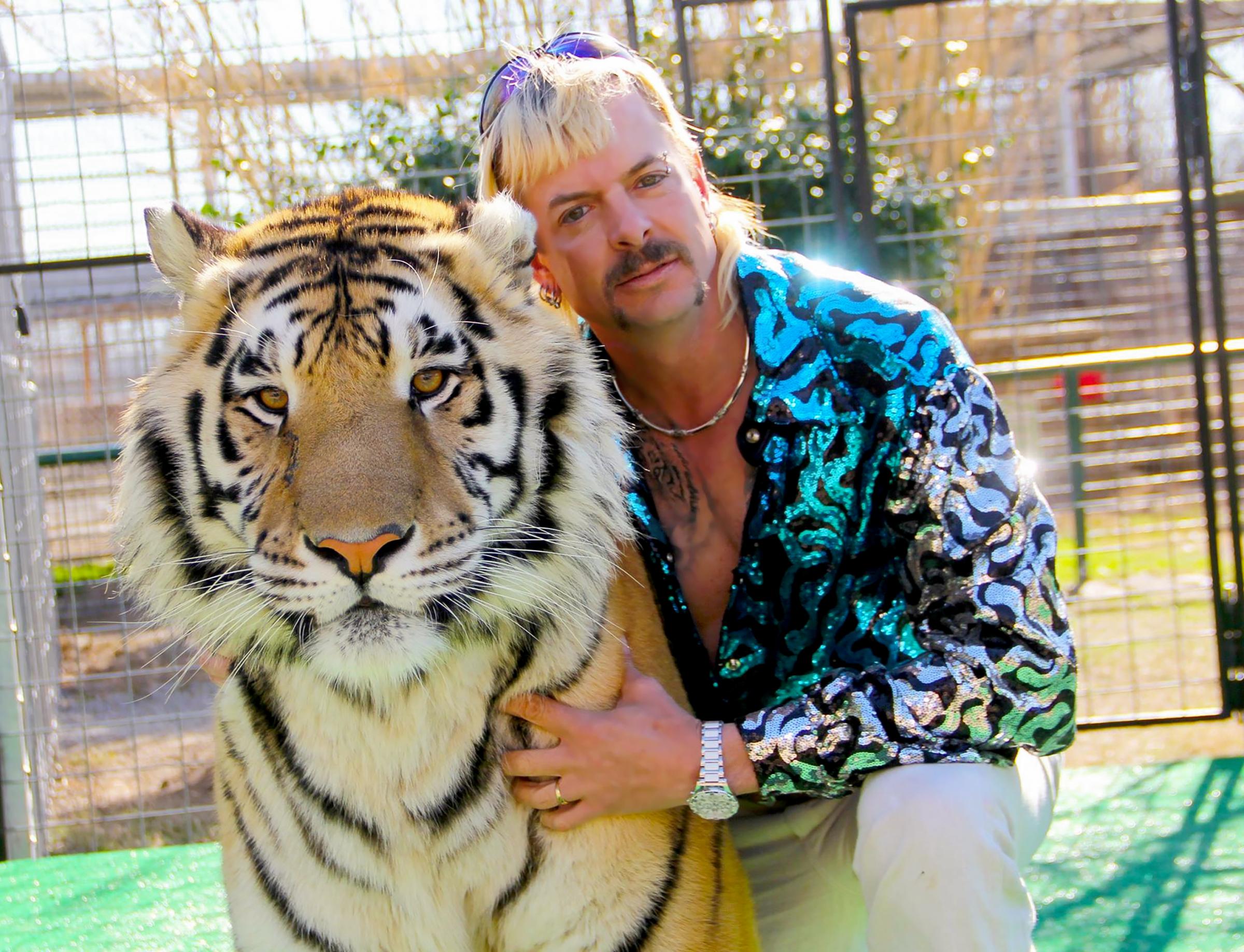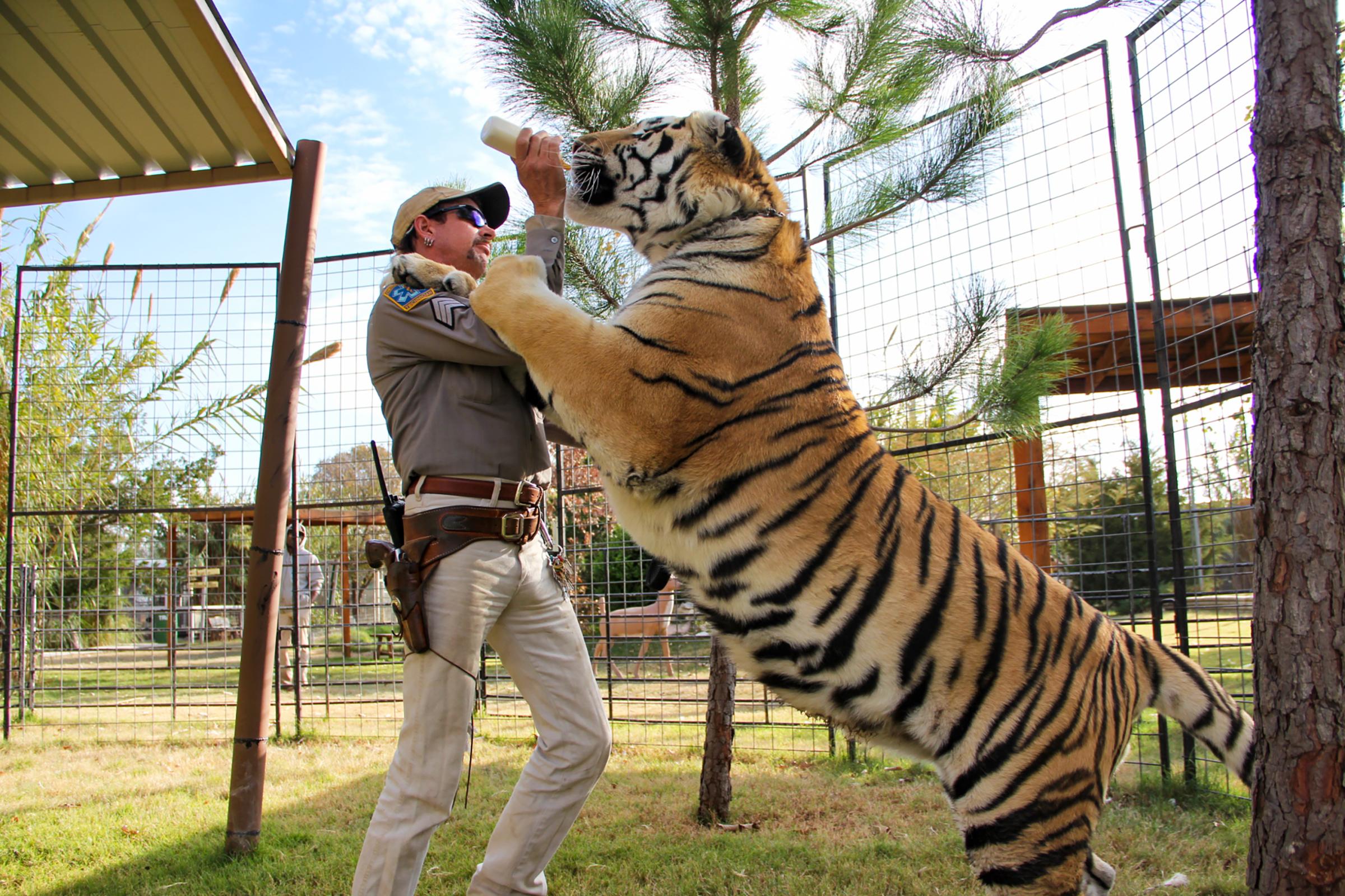Following the global sensation surrounding the documentary series Tiger King: Murder, Mayhem and Madness, Netflix released a special episode featuring interviews with seven of the supporting characters that make up the cast. While Tiger King‘s major figures—the former G.W. Zoo operator Joe Exotic and current Big Cat Sanctuary owner Carole Baskin—did not participate in the special, titled The Tiger King And I, viewers had a chance to hear from Joe Exotic’s former coworkers on what they thought of the series and where they stand now.
Hosted by the comedian Joel McHale, the special featured interviews with Jeff and Lauren Lowe, Erik Cowie, John Reinke, Kelci Saffery, Joshua Dial and Rick Kirkham—all of whom figured prominently in Joe Exotic’s life and were featured throughout the series. Here are the three biggest takeaways from The Tiger King And I.
Joe Exotic has few friends left

Critics have accused the producers behind Tiger King of playing up Joe Exotic’s outlandish personality without drawing enough attention to the way he mistreated animals, including killing tigers. Joe Exotic, whose real name is Joseph Maldonado-Passage, is currently serving a 22-year prison sentence, in part for making up a murder-for-hire plot against Carole Baskin and for killing five tigers. As Tiger King reveals over seven episodes, Joe Exotic’s exploitative actions affected both the people who worked for him at G.W. Zoo and the exotic animals under their care.
Looking back at their time with Joe Exotic, many of his old friends and coworkers express regret about not doing more to fight against his overwhelming power and the way he mistreated animals. Erik Cowie, the head zookeeper, told McHale that Joe Exotic should not be released from prison.
“Twenty-two years doing federal time—that guy’s gonna die in there,” he said. “So, good riddance.”
Jeff Lowe, who was revealed in the series to have a notable criminal history himself, said it was ironic that Joe Exotic was receiving so much attention while in jail. “He’s where he belongs,” Lowe said. “I would probably just tell him, ‘gotcha.'”
Joshua Dial, who served as Joe Exotic’s campaign manager for two unsuccessful political runs (one for president in 2015 and the other for governor of Oklahoma in 2018) revealed that he was also neglected in key ways after a traumatic experience. Dial was working in his office in 2017 when Joe’s former husband, Travis Maldonado, fatally shot himself in front of him. Dial was made to return to work in the same office and told McHale that he never received any mental health counseling to process what he witnessed. He’s now trying to raise enough money to access mental health care; a GoFundMe has been set up to help him out.
Kelci “Saff” Saffery, who lost an arm following a tiger attack—a horrifying event which the docuseries details—probably had the kindest words for Joe Exotic while talking with McHale. According to Saff, the documentary excludes certain things Joe Exotic did to show his loyalty to others, and he does not think Joe deserves to remain in prison forever. “I think justice was served, but I still don’t want to see that man die in prison,” he said.
Not everyone was happy with their portrayals
Unsurprisingly, some of Tiger King‘s cast members were unhappy with how they come across in the series. John Finlay, Joe Exotic’s ex-husband, and Joshua Dial, Joe’s ex-campaign manager, objected to the implication that they were on drugs during the filming of the series.
“I was portrayed as a drugged-out hillbilly,” Finlay told McHale. “At that time, I was four to five years clean.”
Jeff Lowe also objected to his portrayal in the series, in which Joe Exotic implies that Lowe stole the zoo out from under him. “They tried to sensationalize the story,” he said.
Many harbor regrets over the mistreatment of animals

Many people who were in Joe Exotic’s orbit when he was still running the zoo said they regretted following all of his directions in their treatment of animals, especially the tigers that were killed for no reason. Erik Cowie told McHale that he was often brought in to relax big cats before they were put down—and that often, it was healthy big cats that were killed, not sick ones that needed to be put down.
“Those cats trusted me up until the end and somehow, sometimes, I swear they were like, ‘Dude, you let me down,'” Cowie said. “I can see it in their faces and in their eyes.”
Jeff Lowe echoed Cowie’s remarks. “They were not sick. They were beautiful, healthy tigers that he called over to the fence and he shot them in the head because he needed the cage space,” he said. “So Joe goes out and makes the cage space by killing five beautiful, healthy tigers.”
Kelci Saffery said the situation at the zoo was beyond anyone’s control because Joe Exotic was so skilled at convincing others that his choices were right.
“Joe always had a way of explaining his actions,” he said. “They were old, they were injured, they were suffering, is what we got.”
More Must-Reads from TIME
- Caitlin Clark Is TIME's 2024 Athlete of the Year
- Where Trump 2.0 Will Differ From 1.0
- Is Intermittent Fasting Good or Bad for You?
- The 100 Must-Read Books of 2024
- Column: If Optimism Feels Ridiculous Now, Try Hope
- The Future of Climate Action Is Trade Policy
- FX’s Say Nothing Is the Must-Watch Political Thriller of 2024
- Merle Bombardieri Is Helping People Make the Baby Decision
Write to Mahita Gajanan at mahita.gajanan@time.com